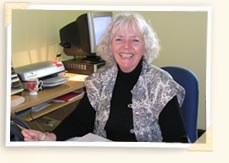 Making
Miracles Making
Miracles
In 1988, at the age of forty, Stella Gaucher-Murovic left a
successful business position to land her dream job—working
with volunteers.
Stella explains, “I wasn’t unhappy in my old
job. There was just something missing in my life.”
Determined to find her “life’s work”,
she earned her degree in applied social science from Concordia
University, and put her smarts to work at organizations like
the Canadian
National Institute for the Blind
and the Crohns
and Colitis Foundation.
She enjoyed the challenges, but still hunted for the right
job.
Luckily for us, she found it at the Douglas Hospital as
the programming and planning agent for the Moving Ahead Program.
Since 2003, she has matched volunteers with patients in group
homes and other residential resources under contract with
the Hospital. Fuelled by Stella’s drive and enthusiasm,
the program has exceeded all expectations—serving an
amazing 132 clients in 64 homes with over 104 active volunteers,
and discrediting powerful stigmas that hinder people’s
recovery from mental illness.
Early Inspirations
Not surprisingly, Stella’s drive to make a difference
started at home, “I was raised by my grandparents in
the forties and fifties, at a time when people tended to
stick to their own race, culture, religion and class. But
my grandfather taught me that there was beauty in all people— whether
they were different from us or not. Above all, he taught
me to put my beliefs into action and to never give up.”
When she entered elementary school, Stella learned what
it was like to be shamed for being different, “I’ll
never forget the day when I didn’t have money to contribute
towards a teacher’s present. When the class presented
her with the gift, she asked everyone who had given money
to raise their hand. When my hand stayed down, she shut me
in the clothes closet and left me there, crying. I’ll
never forget what it felt like to be isolated and stigmatized
for something out of my control. “If I could prevent
anyone else from feeling that way, I would.”
Miracles Happen
As soon as Stella joined the Douglas, she began to visit
group homes and other residences to assess their needs, “Some
residents were doing very well, but others just sat in
front of the television or stared at the walls. The caregivers
did what they could, in addition to their many other responsibilities.
But they knew that some residents needed more social interaction
and exposure to the community than they could provide.”
Step by step, Stella built up a list of volunteers and matched
them with residents, “It’s one of the most difficult
types of volunteer positions to fill, because client needs
are so great. It’s not enough to be friendly and nice.
You have to build a long-term trusting relationship, and
find ways to help the client move ahead from where they are
to where they want to be.“But when it works, miracles
happen.
“Here’s an example: one of our volunteers is
a tiny bird of a woman in her seventies with a will of iron.
I linked her with two isolated female residents. She brought
them to a community centre and helped them get to know the
people there. Now they’re invited to parties and they
invite people home too. They’re also taking the bus
and metro—something they would never have done before. “It’s
taken their self-esteem to a whole different level.”
The benefits don’t stop there, “The residents
go out into the community with volunteers— to parks,
movie theatres, restaurants, churches…everywhere. Their
confidence builds as they interact with family and neighbours,
friends and strangers. Some residents speak candidly about
their illness, helping to break down powerful myths about
mental disorders.”
Keen to improve the program still further, she has also
introduced peer counseling, “We already have four residents
who act as Moving Ahead volunteers. The key is to put the
right two people together. Both need to get something from
the experience.”
All Ages, All Interests
Anyone 18 and over, with any interests, can volunteer, “What
I look for is a good listener, who is enthusiastic and willing
to commit to a minimum of six months to help the resident
move forward in his life. It’s a big commitment and
can’t be taken lightly.”
A Simple Hello
How can we reduce stigma in society? “We can be powerful
mental health ambassadors for the general public by explaining
that many people with mental illness lead productive, satisfying
lives—provided they have the right treatment, encouragement
and support.”
Closer to home, Stella also suggests, “When you see
patients, be sure to look them in the eye and say hello.
It’s such a small thing, but it’s a powerful
way to make sure they feel part of the world around them.
Remember, they’re people first. That’s what destigmatization
is all about.” |